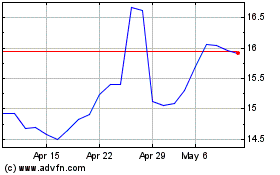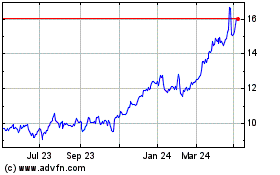Deutsche Bank Beats Expectations but Coronavirus Clouds Outlook--2nd Update
April 29 2020 - 6:58AM
Dow Jones News
By Patricia Kowsmann
It looked like Deutsche Bank AG was finally going to have a good
year. Then the coronavirus came, forcing it to set aside money for
loan losses, disrupting targets and clouding the bank's
outlook.
The uncertainty is an unwelcome development for the German
lender, which for years has struggled to make money and clean up a
massive portfolio of complex and risky bets that it is set aside to
wind down or sell. An overhaul of its business-focused around
cost-cutting and making its investment-banking unit leaner was
starting to bear fruit.
"This changed environment will impact Deutsche Bank's results of
operations, capital ratios and the capital plan that underlies our
targets," the bank said as it officially announced its
first-quarter results Wednesday.
Deutsche Bank said that its revenue for the full year is
expected to fall slightly in 2020 compared with last year, as its
main businesses of lending and serving clients will remain flat,
while asset disposals in its capital release unit -- a type of bad
bank -- may face headwinds given the market turmoil. Provisions for
credit losses, meanwhile, are expected to increase significantly
from low levels.
All that combined means the bank doesn't know whether it will be
able to finally record a pretax break-even result for the year,
following a EUR2.6 billion ($2.8 billion) pretax loss last
year.
"First-quarter [performance] was well ahead of our plan," James
von Moltke, Deutsche Bank's financial chief said in a conference
call. "It's too early to say what the rest of the year will look
like."
Deutsche Bank said it has set aside EUR506 million to cover
credit losses in the first quarter ended March 31, including EUR260
million directly related to the virus. More will come, although Mr.
von Moltke said he is comfortable with the quality of the bank's
loan book.
Despite all that, first-quarter results were actually strong and
better than expected, mostly thanks to an 18% jump in
investment-banking revenue. Its fixed-income trading business did
particularly well, as customers shifted their assets around to
better weather the virus storm, resulting in big fees and
commissions.
Overall profit for the three months ended March 31 still fell
67% to EUR66 million, from EUR201 million a year ago. But the
figure beat analysts' expectations, thanks to a
higher-than-expected revenue of EUR6.35 billion. Revenue at its
corporate bank unit, which caters to clients like midsize German
companies, fell 1% from a year ago. It rose 2% at its private and
retail banking.
Shares of the bank have risen over 19% since late Sunday, when
the bank reported parts of the results. They are still down close
to 6% since the beginning of the year.
Mark Fedorcik, head of the investment bank, said the unit was
doing well before the virus spread in Europe in March, with revenue
growth and market-share gains. Once the virus hit Europe and the
U.S., he said corporate clients focused on getting liquidity
through credit lines, issuance of debt in the markets and in some
cases loan waivers. Institutional investors, meanwhile,
repositioned their investment portfolios based on their risk
appetite.
"We are seeing some fixed-income markets normalize and stabilize
as we move to the end of April," Ram Nayak, head of fixed income,
said.
For the rest of the year, the bank said it expects
investment-banking revenue to decline from the stronger
first-quarter levels, leaving it overall slightly higher in 2020
compared with last year. Corporate banking and private banking
revenue are expected to stay flat. But bigger loan-loss provisions
will hurt their bottom line.
The bank remained on track with its cost-cutting drive, a key
part of a plan it launched last year meant to make it a leaner and
profitable lender focused on European companies and retail-banking
customers. Deutsche Bank reported costs fell 5% in the first
quarter.
Controlling costs is key for Deutsche Bank and other European
lenders given low and negative interest rates across the region
making it difficult to make money. Germany's banking system is also
the least profitable in the eurozone due to its overcrowded market
of more than 1,500 banks.
There too, the coronavirus is an unwelcome development. While
the bank said it remains committed to its targets, it paused
layoffs last month until some stability returns. Chief Executive
Christian Sewing has promised to cut 18,000 of its approximately
92,000 jobs by 2022.
Write to Patricia Kowsmann at patricia.kowsmann@wsj.com
(END) Dow Jones Newswires
April 29, 2020 06:43 ET (10:43 GMT)
Copyright (c) 2020 Dow Jones & Company, Inc.
Deutsche Bank (TG:DBK)
Historical Stock Chart
From Mar 2024 to Apr 2024

Deutsche Bank (TG:DBK)
Historical Stock Chart
From Apr 2023 to Apr 2024
